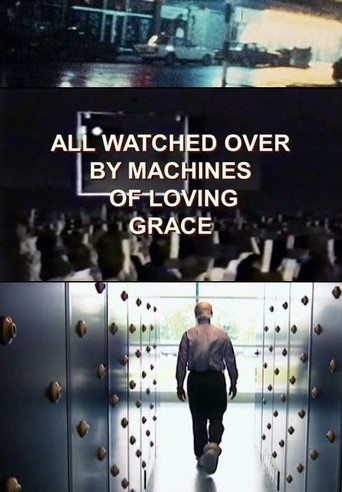

All Watched Over by Machines of Loving Grace (2011)
A series of films about how humans have been colonized by the machines we have built. Although we don't realize it, the way we see everything in the world today is through the eyes of the computers.
Watch Trailer
Cast


Reviews
big ideas. At some point though, I began to feel that the narrator is manipulating information to conform to his conclusions. For instance, he attacks the global financial system and its architects, and portrays them as causing only suffering. But he leaves out the huge increase in global prosperity that has occurred over the last decades. He says that China kept its exchange rate artificially low, and used the trade surplus to lend back to the US instead of helping its own citizens. He leaves out that average Chinese citizen's income is maybe 7 to 10 times what it was 25 years ago. There's a story here and it's not all good or bad. The characters highlighted in the film are interesting and important - but the film misses an opportunity to reveal something more profound about the mysteries of our times - instead I think it leads viewers to simplistic conclusions that can perhaps be as damaging or more than Ayn Rand's philosophies.
I agree with a lot of what has been written about this documentary, but I think some people miss the point. The documentary starts out being almost a Terminator inspired sub-title "The rise of the machines" and describes all the evil machines, but at the end the conclusion is *we* are the machines, the our DNA is the program. Viewed in that light, computers are mere extensions of ourselves and in a way are an attempt to make the computational abilities of the brain more perfect. There are still many, many things the organic brain can do better than a computer, subtle things like social intelligence, body language, emotional intelligence. These are more difficult to encode in a computer because they don't follow the same rules as simply adding 1+1. It is clear evidence that we don't exactly understand the process ourselves, which is why we can't program it into a computer.As I watched this documentary, I was floored by the similarities to a audibook I was listening to by the Dalai Lahma which talked about altruism and how it fits into the selfish gene model. Obviously Dalai Lahma takes a very different view on altruism, believing that it represents a higher function of human existence that cannot be explained by Darwinian view of the selfish gene. This documentary takes the counter view that altruism is just another way of preserving the gene, but it stumbles a little bit by only giving altruistic examples where the individual sacrifices itself for the continuation of it's relatives or the destruction of non-relatives. What about altruistic acts which are for the benefit of non-relatives? There is no adequate scientific explanation for this, yet it happens continuously throughout history. Then again, perhaps it is just another form of insanity.In any case, this documentary is not about computers taking over the world, it is about the belief of HUMANS AS MACHINES and this BELIEF taking over the world. Curtis does not go back farther than Ayn Rand and the 1930s, but surely this idea started with Nietszche and Darwin. In fact then Rand said that Aristotle was the only philosopher that influenced her, I found that hard to believe, because her ideas sound very similar to Nietszche's. This struggle is often interpreted politically as right vs left, materialism vs idealism, capitalism vs socialism.When Curtis ventures into the realm of the online world, here too he stumbles, he attempts to show that "cyberspace" was developed to try and imitate the stable natural ecosystem, but in reality was extremely chaotic. Yes, the online world of blogs, email, texts and tweets can be a mess, but if you look at the growth of illegal downloading, this is surprisingly stable, coherent and efficient. This system of peer-to-peer downloading arose completely spontaneously, and has developed into an extremely reliable way of downloading content, which has built in self regulating processes. This is surprisingly similar to the way a natural ecosystem might develop, including the existence of viruses and anti-viruses.Even with all it's flaws, I can't help but be awe-struck by the Herculean and virtuosic editing techniques used by Curtis, and the unique and incredibly moving use of music to juxtapose against various images. It can be cliché to superimpose happy music over tragic images, but Curtis does it such a way that it just seems brilliant. It's like Tarantino meets David Attenborough meets Radiohead. I would be very surprised if Curtis chooses the music himself, it's hard to imagine someone with such a stuffy English accent could be so hip, but appearances can be deceiving.I highly encourage anyone seeing this to watch his other documentaries, they are all done in his trademark style, which is unique and, at least artistically, unmatched in the documentary world.
An excellent series with important messages (including: an imagined potential for systems to liberate us, ended up controlling us). It's Wikipedia page is informative.Curtis brilliantly and laudably identifies grave problems. But humanity was so foolish to end up with those problems, the series left me wanting. Nothing I'll say impacts his sound theses, but it's Curtis' only series that moves me to other than praise.A primary theme of Curtis' filmography is the tragicomic consequences of ideologies imposed by elites; I love his films so I expect and embrace foolish targets. And identifying problems brings no responsibility to also solve them, particularly when identification is such an impressive contribution. But the fools gallery Curtis necessarily targets while developing the series' theses are so transparent and sterile that I believe more view through them, to depth and substance beyond, was called for. I'm so astonished that their beliefs attracted attention let alone gained currency, and the richly deserving targets are so much more delusional pushovers than in Curtis' other films, that I wanted more. (And I'm more mystified than before by how information processing enchants the analytically-challenged.) Curtis shows both the Internet and systems models fail to deliver things--that it was foolish for anyone to ever imagine they could.(Because I'm not as engaged by this series' topic as I am by Curtis' other best work, on first viewing I made large errors because it's complexity exceeded the attention I paid.) In episode one (e1) I thought Curtis drew a parallel between Ayn Rand and the Internet. On second viewing I found I was wrong. Rand and the Internet share the story in e1. And Curtis draws attention to that, such as when phrasing the belief some held that "computers would liberate us from all the old forms of political control, and we would become Randian heroes in control of our own destiny" (e1@58:17).Curtis shows the Internet couldn't do all the things some people believed it would. And he mentioned that the Internet can do some of those things, but he didn't note that those things it can do were the ones antithetical to Rand, which I think he should've given the attention he draws to Rand and the Internet in his story together, both failing fools.Curtis notes "the Internet had played a key role brought millions of people together" (e2@52:05) for revolutions in former Soviet states last decade. As we again saw during 2011's Arab Spring, in contrast to Rand's non-embrace of community, online social media's ability to manifest a collective consciousness can play an encouraging role in enabling a revolutionary wave.So while Curtis is correct that machines have not liberated us from traditional political structures, they can galvanize the action necessary to start. Thereafter OF COURSE it's up to us to organize the realization of our vision (since, as Curtis points out, "the machines offer no ideas about what comes next" {e2@58:09}). (Incidentally, Curtis' "The Century of the Self" explained that politicians today cede power to the unconscious desires of swing voters, which also deliver no organized or coherent vision forward.) Curtis notes hippie "communes {failed because they} deliberately had no hierarchy of control or authority" (e2@20:33). I lived in a 250-person alternative community of "hippies", and it ran beautifully because like most hippies and non-hippies then and always, we weren't foolish enough to think organization wasn't necessary.(OTOH, while hierarchy is often necessary, marriages can work without one spouse having authority over the other. Had communes remained small enough, and bonding been very strong, people's hearts could've done at least some of what was lacked by, and thus doomed, communes. That might suggest a way forward globally; particularly if Carpenter's 1991 "Pong" experiment {e1@9:21} demonstrated collective connection. Changing people could change politics; the Dalai Lama received an uncommon {anti-Randian} education, and he turned out pretty well; humanity should commit to universally high psychological health/development.) Foolish targets abound. E1's computer visionaries were naïve fools, and Ayn Rand's philosophy is the product of a nearly peerless psychological/emotional infant.E2 brings more idiotic beliefs, such as that inherently lossy models can faithfully reflect reality, and that disturbed ecosystems "would always try to return to an original balanced state" via a purely imaginary "underlying mechanism" (e2@5:03). It's pathetic that Forrester's systems model for the planet's ecosystem "could not imagine a future where human beings, unlike machines, would behave in ways that they hadn't before" (e2@35:35).Regarding the ecosystem model, while Curtis correctly points out it's not true, neither does it have no truth at all. There are interactions between different things in the natural world; they influence each other positively and negatively. The existence of interactions can foster a degree of stability (relative to hypotheticals with minimal interactions), albeit to an essentially dynamic reality (at all scales). The reality of interaction--for example that human actions can cause great harm--makes that part of the ecosystem model of use in understanding, and of motivational use (towards achieving optimally vital results). I think Curtis should've acknowledged these values of the ecosystem model, since they were all anyone who wasn't foolish ever thought it was really right for.{Perhaps asserting that interactions can foster some stability needs no justification. But just in case, a simple hypothetical: a habitat containing grazing animals. Too many of which might cause dramatic population decline, for example from increased risk of epidemic or from stripping the habitat; later (after the epidemic ends or the habitat recovers) the grazers' population might soar. But add to this hypothetical a different animal that preys successfully enough upon the grazing animals to lower such risks, and both the habitat and grazing animal population could gain relative stability.} The series is so densely packed that little could've been added without requiring another part, but with another part I think it could've been substantially stronger. I can't fault Curtis, but I also can't say that all that it did prevented me from feeling more was called for.
I am a fan or Mr. Curtis' previous work but this documentary series was a disappointment for me.The thing I dislike the most is the biased and simple opinion on computers this documentary tries to promote. Apparently "computers" are powerful things that dehumanize our world, we put our faith in computers and they have failed us, completely ignoring the fact that computers are human made, human programmed and human controlled in every aspects. I expected a much more complex and realistic dissection of the topic.This idea is also poorly presented and motivated, for example when briefly talking about the internet, we are presented with the negative opinion of an early internet user, the scene is made in such a way as to suggest that indeed the internet is what that distressed user says. Similar to the cheap techniques a News program would use to influence the public opinion.Throughout the documentary I had the feeling that too much emphasis is put on the soundtrack and on the synchronizing of suggestive footage with music rather than actual relevant content and information.To summarize, "All Watched Over by Machines of Loving Grace" is tendentious, the idea presented is overly simplified and biased. It gave me the impression it was a bad propaganda movie against computers.



